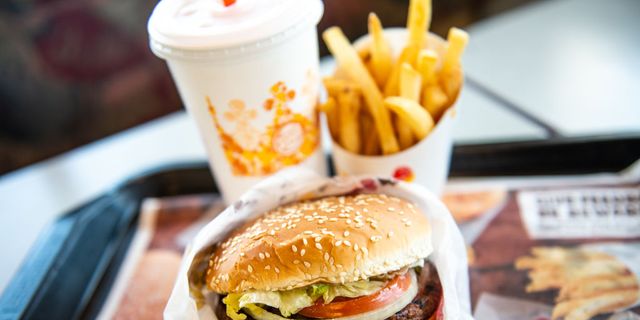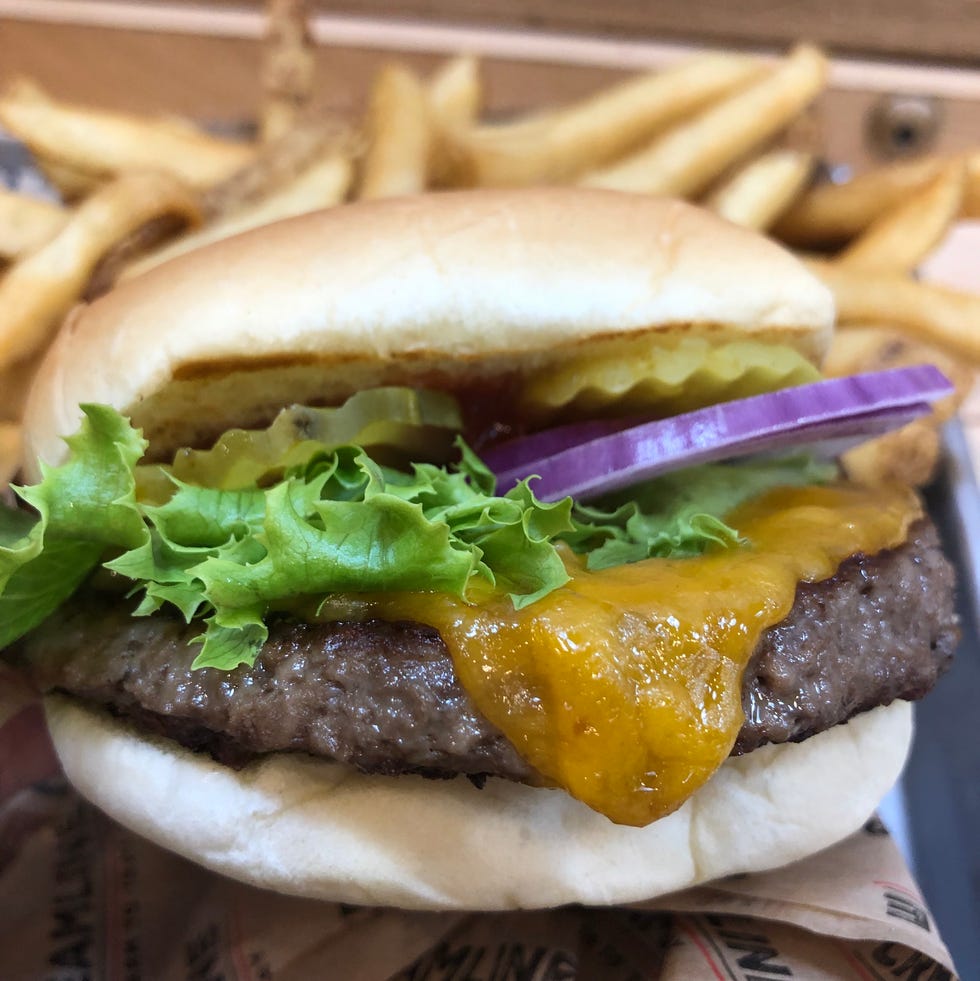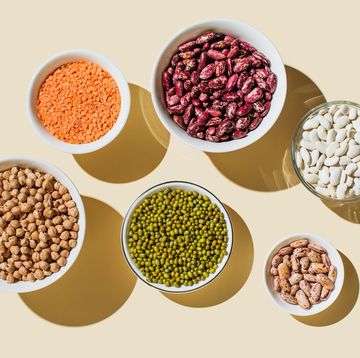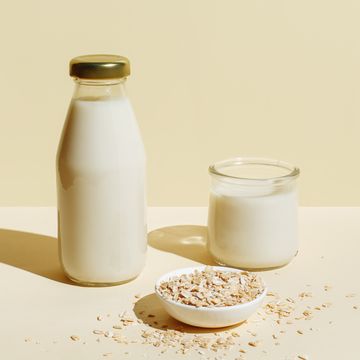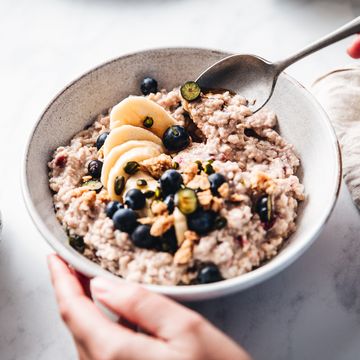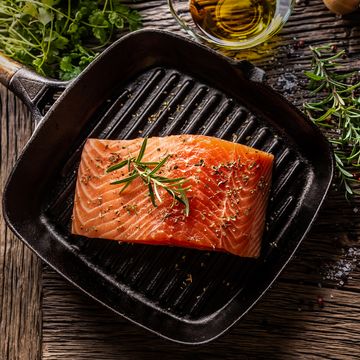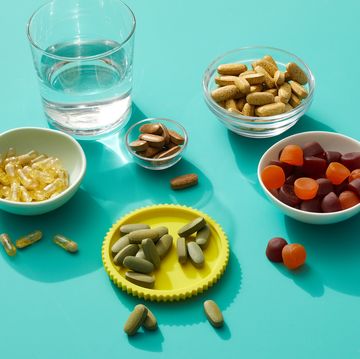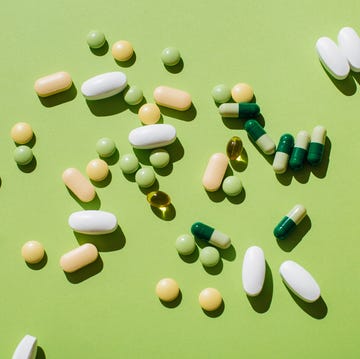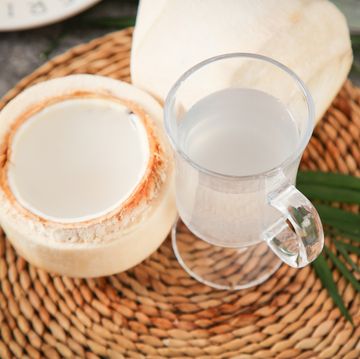The average American eats more than 200 pounds of meat each year — 2018 was a record high per the most recent data from the USDA. That's the equivalent of about 2.4 burgers per day! But what if our burgers didn't have to contain meat at all? That's the possibility presented by Impossible Burger, a vegetarian patty that claims to deliver "all the flavor, aroma, and beefiness of meat from cows," according the company website.
Today, Burger King announced it will soon offer Impossible Whoppers at its franchises across the country, joining more than 5,000 other restaurants slinging the trademarked soy-based burgers. Consumers can also expect to find Impossible Burgers in stores later this year.
The manufacturer, Impossible Foods, claims that its production process generates way less greenhouse gases than cattle farming, but the Impossible Burger may not beat a traditional burger in one regard: nutrition.
"It’s not a universally better choice, no matter what the buzzword is that’s attached to the name," says Jaclyn London, MS, RD, CDN, Nutrition Director at the Good Housekeeping Institute. "Plant-based protein that’s used to create something new — and therefore highly processed — is susceptible to being loaded with sodium and saturated fat."
Here's what you should know about these popular patties:
What are the ingredients in an Impossible Burger?
Vegans and vegetarians will appreciate that Impossible Burgers are made without animal products or byproducts. They're also halal and kosher-certified. The full list of ingredients includes:
Water, Soy Protein Concentrate, Coconut Oil, Sunflower Oil, Natural Flavors, and 2% or less of: Potato Protein, Methylcellulose, Yeast Extract, Cultured Dextrose, Food Starch Modified, Soy Leghemoglobin, Salt, Soy Protein Isolate, Mixed Tocopherols (Vitamin E), Zinc Gluconate, Thiamine Hydrochloride (Vitamin B1), Sodium Ascorbate (Vitamin C), Niacin, Pyridoxine Hydrochloride (Vitamin B6), Riboflavin (Vitamin B2), Vitamin B12.
While they're mostly made with water and soy protein concentrate, Impossible Foods touts that the soy leghemoglobin or "heme" is what makes each burger taste like meat. The magic ingredient is actually an iron-rich protein from soy plants mass-produced using yeast.
What does an Impossible Burger taste like?
Whatever's in an Impossible Burger tastes pretty darn good, and I love a good diner burger. To put it to the test, I recently went with my boyfriend to our local burger joint — Creamline in New York City — and ordered two almost-identical sandwiches: one with an Impossible Burger patty ($12.50) and one with beef ($9.50), each with cheddar cheese, lettuce, pickles, onions, ketchup, and special sauce.
The final product off the grill looked impressive, with the same exact thickness and color as the beef burger. The outer part definitely had that smokey, grilled flavor, the patty itself was "juicy" and filling, and the texture itself felt pretty spot-on for ground beef. My boyfriend couldn't tell the difference between the two, while I felt it lacked a teeny bit of the umami flavor you get with cooked meat. But with the all the toppings and condiments also in the equation, it easily satisfied that burger craving.
When I talked to the kitchen staff, they said the newer version of the Impossible Burger cooks up much better than the initial product because it contains more fat. (The original didn't have any sunflower oil). They also shared that so many people come there to specifically order it, and that a shortage the week before left some regulars unhappy.
Is an Impossible Burger healthy?
Compared to a same-sized beef patty, an Impossible Burger contains a comparable amount of calories (240 to 260), but it scores lower in a few regards. The first is that it contains way less protein — 19 grams versus 28 grams — which may make it less filling, London says.
"The bigger downside of the Impossible Burger is that it’s also 2 grams higher in saturated fat, likely because of the coconut oil that's added," she adds. "Coconut oil contains the highest saturated fat content of any plant-based oil, despite its super 'health halo.'"
The Impossible Burger also contains a lot more sodium — about 15% of your recommended value, compared to just 4% in plain beef. Curious to see exactly how they stack up? Here's what you're getting nutrient-wise in each patty (not including buns or toppings):
Impossible Burger Nutrition Facts
Serving Size: 4 ounces
- Calories: 240
- Total Fat: 14g (18% DV)
- Saturated Fat: 8g (40% DV)
- Trans Fat: 0g
- Cholesterol: 0mg
- Sodium: 370mg (16% DV)
- Total Carbs: 9g
- Dietary Fiber: 3g (11% DV)
- Total Sugars: <1g
- Protein: 19g
- Calcium: 15% DV
- Iron: 25% DV
- Potassium: 15% DV
- Thiamin: 2350% DV
- Vitamin B12: 130% DV
- Zinc: 50% DV
In comparison, here's what you'll find in the same-sized beef patty:
Beef Patty Nutrition Facts
Serving Size: 4 ounces
- Calories: 260
- Total Fat: 16g (25% DV)
- Saturated Fat: 6g (30% DV)
- Trans Fat: 0g
- Cholesterol: 94mg (32% DV)
- Sodium: 89mg (4% DV)
- Total Carbs: 0g
- Dietary Fiber: 0g
- Total Sugars: 0g
- Protein: 28g
- Iron: 17% DV
- Potassium: 11% DV
The bottom line: "If you love burgers and you’re opting in on the Impossible Burger because 'plant-based' seems like the healthier alternative, I’d rather you go with the regular burger and enjoy every bite," London say. "The best option if you’re cutting back on meat for sustainability’s sake would be to halve the amount of meat you’re using in that burger, and fill the rest with veggies, especially mushrooms."
However, if you really like the taste of Impossible Burgers and want to order that instead, that's okay too. Just try to choose more wholesome, less processed foods as much as possible, London recommends.
Where can you buy Impossible Burgers?
Right now you can find Impossible Burgers at more than 5,000 participating restaurants across the country. To identify the location nearest you, check this map tool on the Impossible website. White Castle currently offers Impossible Sliders for $2 a pop and Burger King also plans to offer Impossible Whoppers at its some 7,300 franchises before the end of the year, CNN reports.
The good news for curious home chefs: Impossible Foods also plans to sell the patties at grocery stores starting this year. While the company has not confirmed an official launch date or retail partners yet, look for more details coming out soon.

Caroline is a writer and editor with almost a decade of experience. From 2015 to 2019, she held various editorial positions at Good Housekeeping, including as health editor, covering nutrition, fitness, wellness, and other lifestyle news. She's a graduate of the Medill School of Journalism and dreams of the day Northwestern will go back to the Rose Bowl.
